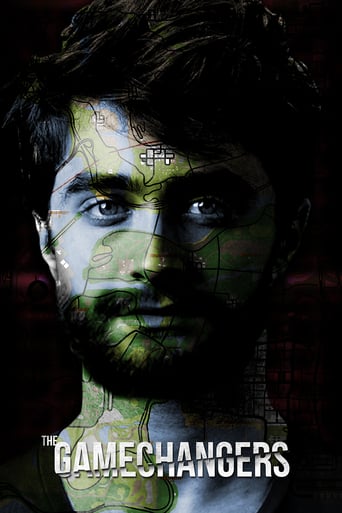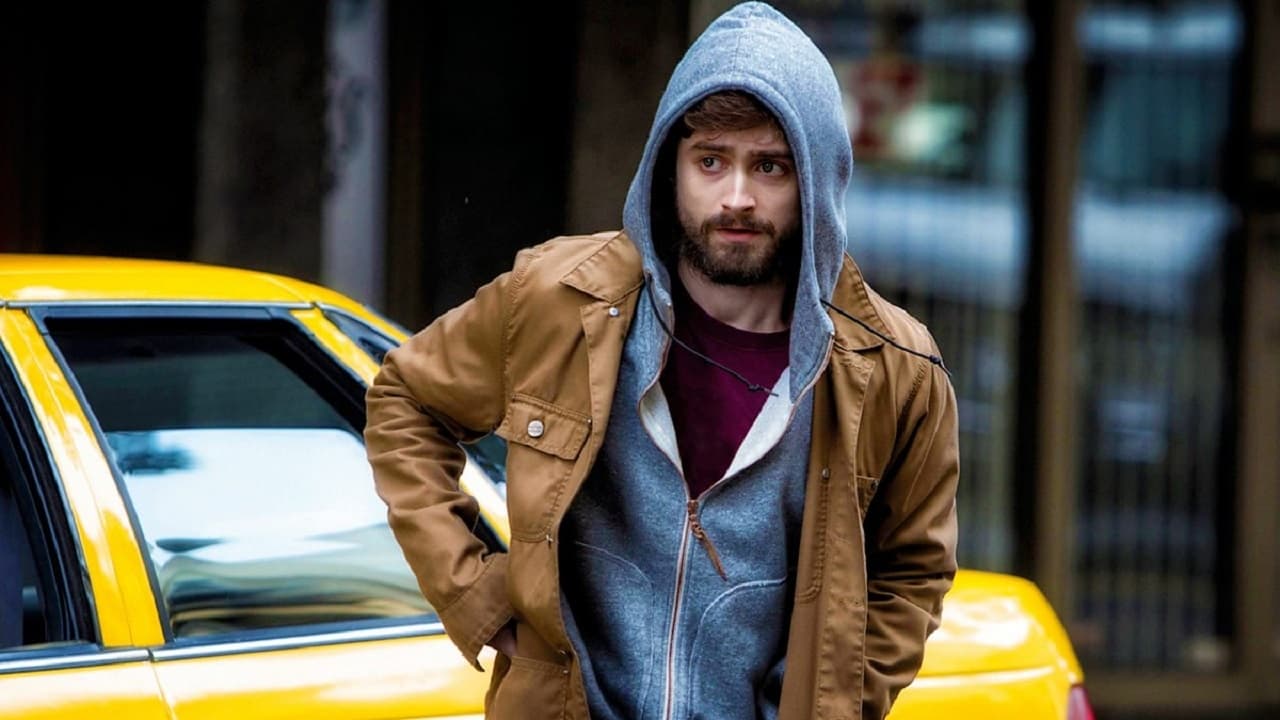adonis98-743-186503
The struggle of Houser's legal feud against American lawyer Jack Thompson, over the morality of the Grand Theft Auto video game series. The Gamechangers is not that good of a film or a tv film but also not that good of a documentary plus the whole controversy surrounding 'GTA' was a pretty damn outrageous to say the least. The acting was not that very good except the late Bill Paxton who was great as the righteous lawyer and then Daniel Radcliffe? who was honestly kind of trying way too hard to play this type of role. Disappointing Documentary. (3/10)
l_rawjalaurence
The basic plot of THE GAMECHANGERS is straightforward, as crusading Florida lawyer Jack Thompson (Bill Paxton) takes on the video-game producers, notably Rockstar and its CEO Sam Houser (Daniel Radcliffe), in the belief that video-games have a destructive effect on child psychology. The inspiration for the case comes from the killing of three police officers in Alabama by teenager video-game player Devin Moore (Thabo Rametsi).Owen Harris's production is built round a series of oppositions. Thompson believes that video-games are destructive; Houser advocates free choice. Rockstar's lawyers believe that Houser is exploiting the case for his own ends, and mount a series of counter- accusations. There is a nationalistic subtext running throughout the film contrasting the more liberal Brits (led by Houser) with the more overtly moral Americans, whose censorship laws are apparently far more stringent than those practiced within the United Kingdom. On the other hand Thompson resent Houser and his fellow-Brits for making money out of the American market with little concern for family values.As the drama unfolds, however, we discover that its focus centers more and more on the consequences of extremism. Houser is so obsessed with novelty, with producing the ultimate video game, that he resists any possible criticism from his fellow-workers. Likewise Thompson's obsession with indicting Rockstar, in the belief that God is on his side (the side of 'right' in his view) that he does not realize the destructive effect his actions have on himself and his family. Although loyally supported by his wife (Fiona Ramsay), he might have been better advised to pause and consider the plight of son Johnny (Garion Dowds). Director Harris stresses the links between the two protagonists through repeated shots showing their faces in close-up superimposed on video-game action. Much of the action takes place in darkness, or semi-darkness illuminated by computer screens. We are in a nether-world, one in which light seldom enters. Houser talks a lot about the "adaptability" of his new video-game; in truth both he and Thompson are profoundly un-adaptable insofar as they cannot see any other alternative to life than the contrasting causes they espouse. At one point Thompson asks the question "Who are you?" in close-up; we might interpret that statement as a metaphor for the entire film in which human beings are deprived of their identities.In the end Harris refuses to take sides; on the contrary, he shows how both protagonists are ultimately destroyed. They might have enjoyed "success" in terms of achieving their various ambitions, but at what cost? Perhaps the only way out would have been to follow the example of Houser's colleague Jamie (Joe Dempsie) and leave the whole affair behind. Yet this is something that the obsessive protagonists cannot do.
pixlbandits
After a day of hard graft in the Pixel Bandits office, we sat down and had a dinner that couldn't be beat. After putting baby bandit to bed we saw Gamechangers, the BBC Documentary about the creation of Grand Theft Auto and thought it would be worth a watch. Our night went downhill from there. Today's soundtrack on the left is from the Fifth installment of the super franchise.Now it wasn't a "bad program" from the outset. It has a decent cast, including screen bigwig Bill Paxton and Daniel Radcliffe who has certainly come a long way from the shoddy child acting when he starred as "The Little Wizard Who Could", but from the outset something was jarring at me... Following a portrayal of Rockstar after the release of Vice City and working through the construction of San Andreas the program starts heavy and hard with Rockstar celebrating a staggering amount of profit on Vice City and quickly into a depiction of Devin Moore and his brutal murder of three police officersWhich leads us to the first point, that this "Docu-Drama" is, from the outset, less genuine than a cardboard Buster sword. Fiction quickly overtook fact in a poor and unsuccessful scramble for entertainment value. Seemingly within a few weeks Vice City is released, Moore is arrested, killing three officers and former attorney Jack Thompson steps in as the gallant hero on a crusade to stop parents from buying 18 rated games for their underage children stop people making violent games.In reality, Moore was arrested June 7 2003, around 8 months after the release of Vice City, and it wouldn't actually be until 2005 that Jack "Righteous Thunder" Thompson came anywhere near this case. Again, in the BBC adaptation of the truth you're led to believe that Jack Thompson has never been on a computer in his life, and yet the reason that he didn't jump straight to Moore's defense may well have been because in 2003 he was trying the same kind of thing with GTA 3 and a lad of 16 called Dustin Lynch, who murdered his friend in Ohio.The big things in the program are right, Devin Moore did kill three people, Hot Coffee was a (really rather naff) sex scene left on the disc but unreachable by normal players, however it is interspersed with misinformation and falsehoods which really brought down what could otherwise have been a factual look at the link between gaming and violent behavior, but that still would have made me angry. why?Because the media keep asking that big question. Do Violent video games make you violent. The very fact that this argument is still raging after 23 years, since the release of the first Mortal Kombat, perpetuates the myth. If there is no link, why are we still asking the question, the fact that headlines and click-bait ask this question regularly will lead anybody who doesn't look behind them to the conclusion that they must do, otherwise, what's the big hooha?A psychological study recently revealed that playing violent video games can be a "risk-factor" to exhibiting increased aggression, however not only did they also point out that there was no evidence that this influence was enough to lead to criminal acts and, let's be honest here, the same desensitizing and copy cat behavior can be taken from anything from books, to film, to television, so why the focus on gaming?To quote the Independent online newsblog, "The findings have prompted a call for more parental control over violent scenes in video games from the American Psychological Association (APA)." which again is absolutely absurd. The thing about these violent games is that, make no mistake, there is a brutal amount of gore and bodily destruction. In GTA you can pay for intercourse with a prostitute and then beat her until she dies and you get your money back. Do I want my eleven year old to play that, of course not. Do I want stricter parental controls on the game, also a no... becauseVideo games, much like film, have something in the way of control already. It's taken out of the parents hands. The video gaming development community themselves work with various boards in order to ensure that children do not have the opportunity to perform any of these acts or even witness any of this violent content... and you've probably seen it a few times a day. Each and every one of the games listed in court cases and studies is an age 18 restricted game in the UK. This means that it is illegal for children to buy it, much like alcohol, tobacco, or firearms.So, who is to blame here. Who is the one to point the finger at when children are exposed to levels of violence that (most of us agree) they shouldn't be seeing. Do we curse out the developers, who spend time developing an adult content game? Do we take to court the classification board who rate the game for sale (by law) to only adults? Do we ransack the offices of the retail stores who 99 times out of a hundred refuse to sell these items to children due to the massive fines and jail time they could serve for doing so? Or should we blame the parents, who buy age restricted games for their children because they are not legally allowed to buy it for themselves?
Andrew Smith
I'm usually a big fan of most of the BBC's output but I find it impossible to understand why when one side in the drama wanted nothing to do with it that they decided to proceed anyway and they did so with none of the explanation or background that would've humanised the staff of Rockstar Games.To deem the drama factual is laughable, almost every person depicted was a characterisation in one way or another (sharp-suited, curt lawyers / scruffy game developer / insomniac gamer)
In fact so little character development occurs I don't even think it's correct to classify it as a drama.I think the biggest failure was the disconnect between the over- clarifying language used throughout and the areas where the message was lost because of a lack of consistency with that format
Namely that at no point was it spelled out that the game was not being sold to children but being purchased by adults. They were happy to allow the opposition to repeatedly (to the point of nausea) claim that the game was corrupting their children but never in their otherwise blanket exposition state that the game wasn't aimed at or allowed to be legally sold to children.There were things it did well such as stating that no firm links exist between violence in media and reality and depicting the difficulties faced by the opposition lawyer who brought the case and his family however these failed to make up for what was otherwise a rushed overview that failed to provide sufficient justification about Rockstar Games' motives or goals. How did they expect they could create a meaningful drama by trying to glean information from court documents and articles rather than speaking to actual people? I suspect the irony of the BBC failing to understand how a "factual" drama about a video game world without the input of any "real" individuals is lost on them.


 AD
AD


